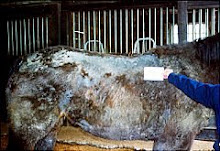By Barry Tompkins
Posted: 03/28/2009 04:09:12 PM PDT
People keep asking me about Bill the Dog and why I haven't written about him for several months. Well, Bill's just fine, but he hasn't come up with any good column ideas for me for quite some time, so I couldn't really justify droning on about how our house remains safe from squirrels (Bill's primary job), or how he inevitably finds the lap of the house guest who least likes dogs to prop his head on at a dinner party. While we get big laughs out of our guest's wild-eyed wondering when exactly Bill's teeth will sink deeply into their privates, it's not quite column fodder.
Until today, when Bill's book club began reading the latest tome from Joe Camp - the creator of one of Bill's heroes, Benji. Joe has written a book, "The Soul of a Horse," in which he suggests that we mere humans have something to learn from our equine friends.
Now I must admit that at first blush I was looking for something humorous in that premise until I started doing a little research of my own.
To begin with, other than the Budweiser Clydesdales, the only horses I ever took notice of had numbers on their saddle cloths and were ridden by little Hispanic gentlemen with names like Jorge and Braulio. I didn't even know they named the critters until I was in my 30s. It was always, "C'mon 2, baby needs a new pair of shoes."
Rumor around the back barn was always that a horse was dumber than a pig. And, while I had never measured a pig's IQ score, I assumed that it was somewhat low in reading comprehension and thus a horse was pretty much akin to a bag of rocks on the intelligence scale. Until the man who gave us Benji gave me insight.
Camp suggests that we humans accept leadership as innate, but that we could develop better leadership skills by acting like a horse. He says that the herd hierarchy mirrors relationships among people. "The stallion," Camp says, "doesn't bully the herd. His job is procreation and protecting the herd from predators. The true leader is the matriarch - the older and wiser mare. She's the one who decides when everyone eats, rests, moves and sleeps."
The mare uses discipline with discretion, but more often politely seeks good behavior. No intimidation. Thus, the herd fortifies its belief in her as a leader. What a concept for humans.
Upon further review - as they say in the National Football League - it turns out that horses share many of the same qualities as we humans: Adaptability, mischief, playfulness, loyalty, jealousy and stress. I guess it's just my luck that I happened to pick the ones with mischief, jealousy and stress every time I go to Golden Gate Fields.
Horses are also social and accepting of others. They meet each other with necks extended and bowed, they touch noses and exchange scents by blowing short blasts of air into each other's nostrils (ironically, exactly the same way I met my wife). It is, say the equine experts, the equivalent of exchanging business cards - which, of course, would be impossible because scientific research has proven that horses have neither wallets nor pockets.
I sincerely hope that Bill the Dog and his book club friends learn something from Joe Camp's book. I've been telling him for years that when meeting a peer, the other end generally smells better.
As for myself, I no longer am using the daily racing form for source material and prior performance statistics when I go to the racetrack. I'm merely looking for innate leadership skills.
Barry Tompkins is a longtime sports broadcaster who lives in Marin. Contact him via lifestyles@marinij.com.
Thursday, April 2, 2009
Subscribe to:
Post Comments (Atom)

















No comments:
Post a Comment